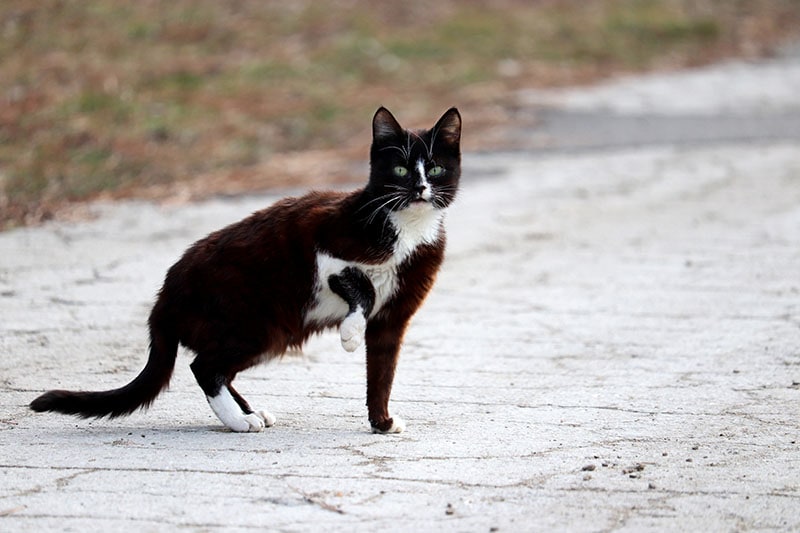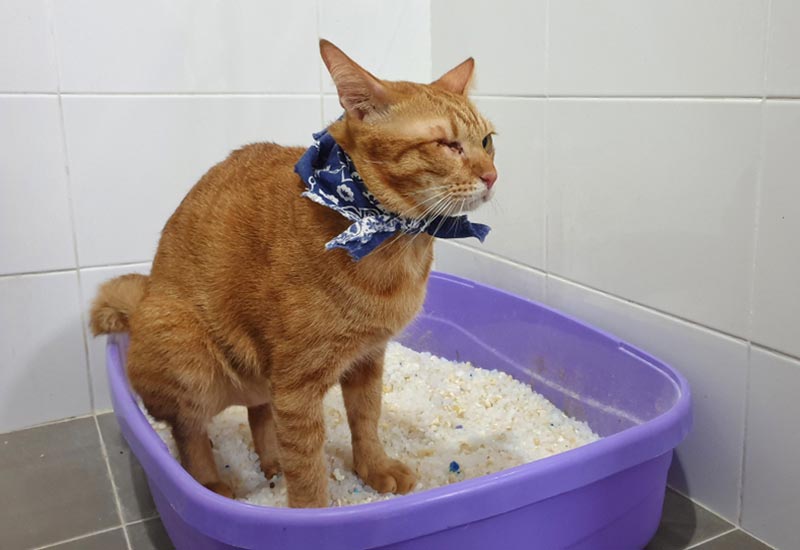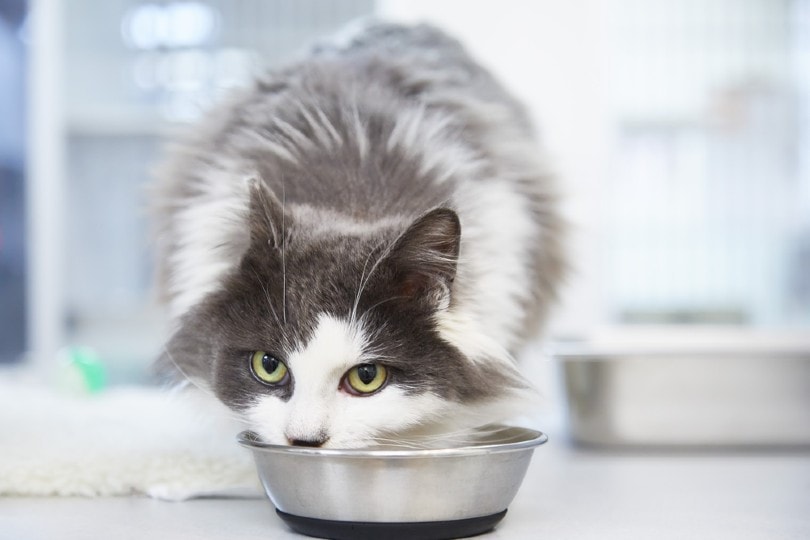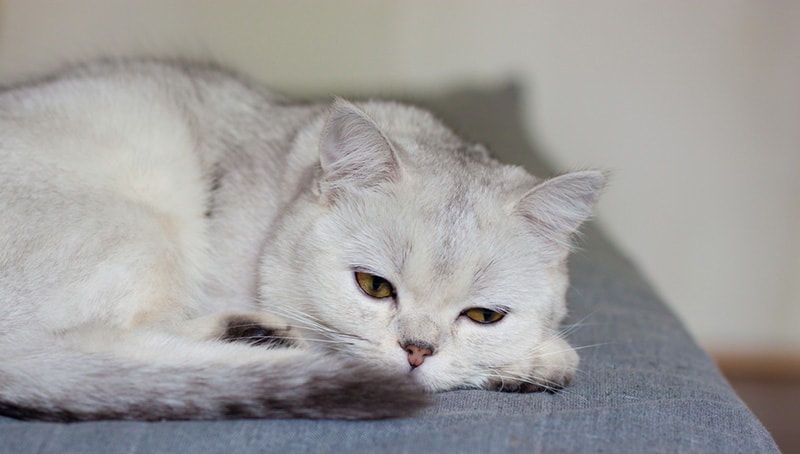
Click to Skip Ahead
Cats are so well known for their balance that we even have sayings about them always landing on their feet. What does it mean if your cat can’t stay upright on flat ground?
While coming home to a cat that suddenly can’t keep their balance is alarming, there are many reasons this could happen, the most common of which either resolve on their own within a couple of weeks or are easily treatable. We’ve collected everything you need to know about the loss of balance in cats in case this happens to your cat.
What Is Loss of Balance in Cats?
A cat keeps their balance by tracking where their body is with respect to the gravity around them. They use information from their eyes, ears, and what the rest of their body can feel. Inside their inner ear is a series of tubes filled with fluid that can also sense and communicate movement to their brain.
One of these many systems needs to be affected for a cat to lose their balance. This means that there are many reasons for a cat to lose their balance, but it ultimately is a change in how a cat can interpret where their body is positioned in space and respond accordingly.
The body system in charge of relaying all this information is the cat’s vestibular system.

Components of a Cat’s Vestibular System
A cat’s vestibular system has a central component and a peripheral component. The central component is the portions of the brain, brainstem, and spinal cord that receive vestibular information. The peripheral component is made up of the inner ear and the nerve that relays information from the inner ear to the brainstem and brain.
Signs of Balance Loss in Cats
Causes of Loss of Balance in Cats
Unfortunately, there are many things that can cause a loss of balance in cats.
1. Idiopathic
Perhaps not a strong start, but idiopathic means we don’t know the cause. Idiopathic vestibular disease is the most common type of vestibular disease in cats. These cats have a sudden onset of signs that will get progressively better with time, not worse.

2. Otitis Media/Interna
These inner and middle ear infections are the next most common cause of vestibular disease in cats. Since the inner ear is part of their vestibular system, infections and inflammation can affect how information is relayed to the brain and lead to signs of balance problems such as a head tilt or falling to the side.
3. Vascular Changes
In the event of a stroke or brain bleed, there can be areas of cell death in the brain, which, if they occur in the vestibular system, can lead to loss of balance for a cat.
4. Encephalitis
Encephalitis means inflammation of the brain. This can happen because of an infection, which can be from bacterial, viral, fungal, or parasitic causes. Feline infectious peritonitis (FIP), which is viral, or Toxoplasma, a parasite, are more likely causes of encephalitis.
Meningo-encephalitis means inflammation of both the brain and the meninges, the membrane surrounding the brain. This specific form of inflammation is usually an auto-immune response.
5. Polyps
These benign growths inside a cat’s nasal passage can cause inflammation of the nerves in the area, which can confuse a cat’s balance until this is resolved.

6. Toxins
Some toxins affect the parts of a cat’s vestibular system specifically. The most common examples of these are aminoglycoside antibiotics and metronidazole, which don’t always have this issue but are a potential side effect in rare cases.
7. Hydrocephalus
For loss of balance in kittens, hydrocephalus is a potential cause. This is a congenital condition, meaning kittens are born with it, and it is caused by a pregnant cat suffering from certain diseases while pregnant, such as feline panleukopenia. This can lead to abnormal brain development in their kittens, such as hydrocephalus, which is an abnormally large accumulation of cerebrospinal fluid (CSF) in the brain, leading to lifelong signs of poor balance.
8. Cancer
Tumors throughout the vestibular system can cause a cat to suffer balance loss.
9. Nutritional
Usually only a concern for cats not eating a commercial diet, thiamine deficiencies can lead to progressive signs of balance issues for cats.

10. Neurodegenerative Disorders
Degenerative diseases of nerves, especially the spinal cord, can lead to progressive balance problems.
11. Trauma
Head trauma specifically can lead to poor balance for a cat, which may be permanent.
How Veterinarians Diagnose Loss of Balance in Cats
In most cases, a veterinarian can tell if a cat is having trouble with their balance with a physical exam. The presence of vestibular signs and response to certain physical tests will confirm if a cat’s vestibular system is behaving abnormally.
In some cases, the physical exam alone can even pinpoint which exact part of a cat’s vestibular system is affected. Using this information, additional testing can be ordered if needed. It’s generally recommended to run a basic blood and urine test on any cats that are having trouble with their balance. For checking the boney inner ear structures of the vestibular system, X-rays, and CT scans can help, or for checking the brain and nervous system, MRIs are often used.
Other tests can include cytologies and even cultures from ear swabs looking for ear infections, parasite screenings, and biopsies or samples taken from the nervous system, such as spinal taps.
How Loss of Balance Is Treated in Cats
Thanks to how the brain is wired, abnormal stimulation of the vestibular system can cause dizziness, nausea, and vomiting. For cats that are showing signs of discomfort such as these due to balance issues, medications can be given to alleviate those signs.
Meclizine can help treat vertigo and dizziness, and nausea medications can treat nausea and vomiting. This is a critical step in treating cats with balance disorders as cats can become severely ill to the point of hospitalization and even liver failure if they don’t eat for long periods of time due to nausea.
For cats with ear infections, topical ear medication with potential oral medication can be used for treatment. In cases of idiopathic vestibular disease, cats will get better on their own within 2 to 3 weeks and just need supportive care until then.
In less common cases that aren’t idiopathic or ear infections, it’s usually best for a cat to visit a neurologist and potentially other specialists, where tests like CTs and MRIs can be run, and treatment can be pursued based on results.

Recovery and Management for Cats That Lose Their Balance
For most cases of loss of balance in cats, they will recover on their own or with the treatment of an ear infection, depending on the case. Both of these treatments usually take about 2 to 3 weeks, so while that is happening, you want to keep your cat as comfortable as possible.
Focus on keeping them well hydrated and eating since they may be reluctant to get up and move toward their bowls and might be vomiting, which can make dehydration worse. Be sure to report to your veterinarian if your cat is hypersalivating, vomiting, or has less appetite than usual, as they can give medications to help with this.
Cats whose balance is unsteady may be distressed. Providing a quiet, cool, semi-dark area for your cat can help them relax, though total darkness may make things worse for some cats, as being able to see can help with dizziness.
When picking up a cat that has lost their balance, go slow and be sure to support them well, as the movement will likely make them feel worse at first. It may help to wrap them in a towel first and be wary of being bitten or scratched.
It’s usually best to remove cat trees and set your cat up in an area without high climbing spaces until they adapt to their loss of balance to prevent injury.
Frequently Asked Questions (FAQs)
Can cats recover from losing their balance?
Yes, in most cases, cats will recover completely from their episode of balance loss.
Do cats that lose their balance become blind?
While you may notice constant flickering of your cat’s eyes back and forth as if they cannot see, along with other signs of loss of balance, this isn’t because they’ve gone blind. It has to do with a reflex in their vestibular system and resolves with the rest of their loss of balance signs when the cause is treatable.
Can ear medications and cleaners cause a cat to lose their balance?
Yes, unfortunately, they can. Sometimes if an infection is already present, signs can get worse when an ear cleaning temporarily increases inflammation in the area. Other times the sensitive structures inside a cat’s ear can react to anything placed into the ear canal, which may include medications or cleaners, leading to transient or permanent signs of loss of balance or deafness.
Conclusion
Despite how scary it can be to realize your cat can’t keep their balance, the good news is this is usually something that will improve in a couple of weeks or can be treated until it resolves in that time too. If you ever notice signs of loss of balance in your cat, reach out to your veterinarian so they can help get to the bottom of what’s wrong and get your kitty whatever they need to feel better.
Featured Image Credit: Jumpstory







